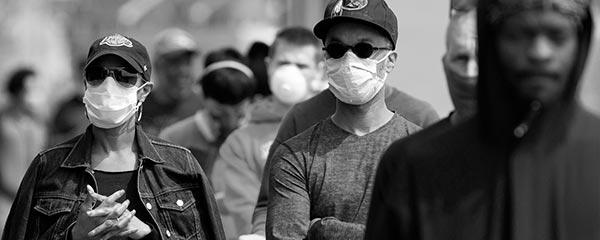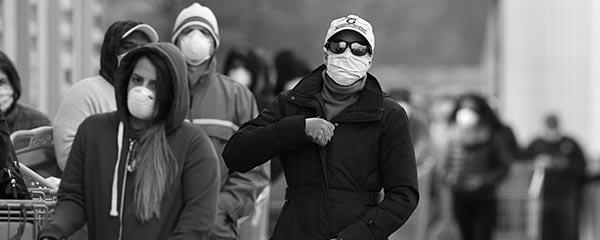Story Highlights
- Cost would discourage millions from seeking care for suspected COVID-19
- Misunderstanding of primary symptoms likely playing a role
- About 15 million have been denied care for themselves or a spouse
This is the first article in a special two-part series, conducted in partnership with West Health, a family of nonprofit and nonpartisan organizations focused on lowering healthcare costs for seniors, on the rising cost of healthcare in the U.S. The second article examines public perceptions of rising prescription drug costs and the progress that the Trump Administration has made to curtail them.
WASHINGTON, D.C. -- One out of every seven (14%) U.S. adults report that they would avoid seeking healthcare for a fever and a dry cough for themselves or a member of their household due to concerns about their ability to pay for it. When framed explicitly as believing to have been infected by the novel coronavirus, 9% still report that they would avoid seeking care. Adults under 30, non-whites, those with a high school education or less and those in households with incomes under $40,000 per year are the groups most likely to indicate they would avoid seeking out care.
| Fever and dry cough | Suspected coronavirus infection | |||||||||||||||||||||||||||||||||||||||||||||||||||||||||||||||||||||||||||||||||||||||||||||||||||
|---|---|---|---|---|---|---|---|---|---|---|---|---|---|---|---|---|---|---|---|---|---|---|---|---|---|---|---|---|---|---|---|---|---|---|---|---|---|---|---|---|---|---|---|---|---|---|---|---|---|---|---|---|---|---|---|---|---|---|---|---|---|---|---|---|---|---|---|---|---|---|---|---|---|---|---|---|---|---|---|---|---|---|---|---|---|---|---|---|---|---|---|---|---|---|---|---|---|---|---|---|
| % | % | |||||||||||||||||||||||||||||||||||||||||||||||||||||||||||||||||||||||||||||||||||||||||||||||||||
| All U.S. Adults | 14 | 9 | ||||||||||||||||||||||||||||||||||||||||||||||||||||||||||||||||||||||||||||||||||||||||||||||||||
| Age | ||||||||||||||||||||||||||||||||||||||||||||||||||||||||||||||||||||||||||||||||||||||||||||||||||||
| 18-29 | 22 | 12 | ||||||||||||||||||||||||||||||||||||||||||||||||||||||||||||||||||||||||||||||||||||||||||||||||||
| 30-49 | 16 | 11 | ||||||||||||||||||||||||||||||||||||||||||||||||||||||||||||||||||||||||||||||||||||||||||||||||||
| 50-64 | 8 | 3 | ||||||||||||||||||||||||||||||||||||||||||||||||||||||||||||||||||||||||||||||||||||||||||||||||||
| 65+ | 10 | 7 | ||||||||||||||||||||||||||||||||||||||||||||||||||||||||||||||||||||||||||||||||||||||||||||||||||
| Race | ||||||||||||||||||||||||||||||||||||||||||||||||||||||||||||||||||||||||||||||||||||||||||||||||||||
| White | 10 | 6 | ||||||||||||||||||||||||||||||||||||||||||||||||||||||||||||||||||||||||||||||||||||||||||||||||||
| Non-white | 22 | 14 | ||||||||||||||||||||||||||||||||||||||||||||||||||||||||||||||||||||||||||||||||||||||||||||||||||
| Education | ||||||||||||||||||||||||||||||||||||||||||||||||||||||||||||||||||||||||||||||||||||||||||||||||||||
| High school or less | 22 | 13 | ||||||||||||||||||||||||||||||||||||||||||||||||||||||||||||||||||||||||||||||||||||||||||||||||||
| Some college | 16 | 10 | ||||||||||||||||||||||||||||||||||||||||||||||||||||||||||||||||||||||||||||||||||||||||||||||||||
| College graduate | 4 | 2 | ||||||||||||||||||||||||||||||||||||||||||||||||||||||||||||||||||||||||||||||||||||||||||||||||||
| Postgraduate degree | 4 | 2 | ||||||||||||||||||||||||||||||||||||||||||||||||||||||||||||||||||||||||||||||||||||||||||||||||||
| Annual household income | ||||||||||||||||||||||||||||||||||||||||||||||||||||||||||||||||||||||||||||||||||||||||||||||||||||
| <$40,000 | 22 | 14 | ||||||||||||||||||||||||||||||||||||||||||||||||||||||||||||||||||||||||||||||||||||||||||||||||||
| $40,000-<$100,000 | 13 | 6 | ||||||||||||||||||||||||||||||||||||||||||||||||||||||||||||||||||||||||||||||||||||||||||||||||||
| $100,000 or more | 5 | 3 | ||||||||||||||||||||||||||||||||||||||||||||||||||||||||||||||||||||||||||||||||||||||||||||||||||
| ║┌┴¤═°-West Health Healthcare Costs Survey, April 1-14, 2020 | ||||||||||||||||||||||||||||||||||||||||||||||||||||||||||||||||||||||||||||||||||||||||||||||||||||
These results are a part of an ongoing special study by ║┌┴¤═° and to assess U.S. public opinion on the cost of healthcare, conducted April 1-14, 2020. Fever and a dry cough are two of the most of COVID-19, the disease caused by the coronavirus.
Unwillingness to seek out care due to concerns over cost is related to familiar socioeconomic distinctions. Hispanics and blacks are less likely to have health insurance than are non-Hispanic whites, and those in lower-income households are far more likely to be when considering if they will follow recommended medicine or procedures from their doctors.
Mentioning coronavirus by name reduces the percentage of people who would not seek treatment by roughly one-third, suggesting that lack of clarity regarding the common symptoms of COVID-19 could be a factor in not pursuing it beyond household economics or basic access.
Millions Report Having Been Denied Care Due to Patient Volume
Amid those avoiding care due to concerns over costs, 6% of respondents -- representing about 15 million adults -- report that they or a family member have been denied care due to heavy patient volume brought on from the coronavirus outbreak. These occurrences could potentially include those who had selective surgeries and related appointments canceled due to state policy.
Those living in the Northeast region (11%) are the most likely to report having been denied care, followed by the West (8%). Just 5% in the South and 3% in the Midwest report the same, likely reflecting regional differences in COVID-19 diagnoses and associated hospitalizations. New York state has by far the in the U.S., followed by New Jersey, Pennsylvania and California -- all Northeast or West region states.
Although race does not strongly relate to being denied care, income level is strongly inversely related. While 3% of those with annual household incomes exceeding $100,000 report such occurrences, this jumps to 11% of those with incomes of under $40,000 -- nearly four times higher.
| Denied care due to patient volume | ||||||||||||||||||||||||||||||||||||||||||||||||||||||||||||||||||||||||||||||||||||||||||||||||||||
|---|---|---|---|---|---|---|---|---|---|---|---|---|---|---|---|---|---|---|---|---|---|---|---|---|---|---|---|---|---|---|---|---|---|---|---|---|---|---|---|---|---|---|---|---|---|---|---|---|---|---|---|---|---|---|---|---|---|---|---|---|---|---|---|---|---|---|---|---|---|---|---|---|---|---|---|---|---|---|---|---|---|---|---|---|---|---|---|---|---|---|---|---|---|---|---|---|---|---|---|---|
| % | ||||||||||||||||||||||||||||||||||||||||||||||||||||||||||||||||||||||||||||||||||||||||||||||||||||
| All U.S. Adults | 6 | |||||||||||||||||||||||||||||||||||||||||||||||||||||||||||||||||||||||||||||||||||||||||||||||||||
| Region | ||||||||||||||||||||||||||||||||||||||||||||||||||||||||||||||||||||||||||||||||||||||||||||||||||||
| Northeast | 11 | |||||||||||||||||||||||||||||||||||||||||||||||||||||||||||||||||||||||||||||||||||||||||||||||||||
| West | 8 | |||||||||||||||||||||||||||||||||||||||||||||||||||||||||||||||||||||||||||||||||||||||||||||||||||
| South | 5 | |||||||||||||||||||||||||||||||||||||||||||||||||||||||||||||||||||||||||||||||||||||||||||||||||||
| Midwest | 3 | |||||||||||||||||||||||||||||||||||||||||||||||||||||||||||||||||||||||||||||||||||||||||||||||||||
| Race | ||||||||||||||||||||||||||||||||||||||||||||||||||||||||||||||||||||||||||||||||||||||||||||||||||||
| White | 6 | |||||||||||||||||||||||||||||||||||||||||||||||||||||||||||||||||||||||||||||||||||||||||||||||||||
| Non-white | 8 | |||||||||||||||||||||||||||||||||||||||||||||||||||||||||||||||||||||||||||||||||||||||||||||||||||
| Annual household income | ||||||||||||||||||||||||||||||||||||||||||||||||||||||||||||||||||||||||||||||||||||||||||||||||||||
| <$40,000 | 11 | |||||||||||||||||||||||||||||||||||||||||||||||||||||||||||||||||||||||||||||||||||||||||||||||||||
| $40,000-<$100,000 | 4 | |||||||||||||||||||||||||||||||||||||||||||||||||||||||||||||||||||||||||||||||||||||||||||||||||||
| $100,000 or more | 3 | |||||||||||||||||||||||||||||||||||||||||||||||||||||||||||||||||||||||||||||||||||||||||||||||||||
| ║┌┴¤═°-West Health Healthcare Costs Study, April 1-14 2020 | ||||||||||||||||||||||||||||||||||||||||||||||||||||||||||||||||||||||||||||||||||||||||||||||||||||
Implications
The seriousness of the COVID-19 pandemic is multi-faceted. In addition to the threat of infection by the coronavirus itself, workers worldwide have lost their jobs, with many now suffering . Compounding these effects is the cost of healthcare generally. Recent research has shown that millions of Americans know someone who has died in the last 12 months due to their inability to pay for treatment and that $88 billion in borrowing occurred over the last year for healthcare. As such, results that show 14% unwilling to seek treatment for COVID-19 symptoms and another 9% unwilling to seek treatment -- even when coronavirus is suspected -- should not be shocking, even amid the outbreak.
Overrun hospitals in New York, in turn, appear to have , which is a good sign for people who are seeking care but can not get it or who otherwise are avoiding hospitals or doctors' offices for fear of infection. Nationally, a plateau for COVID-19 is given current levels of testing, with of infection.
Seeking care when exhibiting COVID-19 symptoms or when suspecting of having been infected by the coronavirus is a critical element in combatting the outbreak. Greatly increased testing is a prerequisite for reopening the economy, with experts recently estimating that for a safe reopening to occur. About . Still, according to recommendations from Harvard researchers, this needs to increase to 500,000 to 700,000 in order to effectively identify those who are infected -- including those who are asymptomatic -- and isolate them from those who are not. Per capita, the U.S. currently ranks 41st in the world in , with about 17,000 tests completed for every one million persons thus far.
Fears over the cost of testing are not unfounded. Early last month, Vice President Mike Pence announced that , followed on March 18 by the passage of the that mandates that Medicare, Medicaid, other government plans and most private plans cover the cost of testing for infection by the coronavirus. But while the testing itself is now free, the overall cost of care for a trip to the hospital in out-of-pocket fees. For example, if the doctor consulted determines that the visit does not justify a test, or is out-of-network, or if the trip requires treatment for other conditions not related to COVID-19, the health law does not cover the costs of the visit.
As such, greater clarity regarding these issues for the public is advisable. It would likely be prudent for leaders and public health officials to not assume that the main symptoms of COVID-19 are universally known and to continuously provide updated information for where to go for local testing, cost expectations for treatment, and patient capacity at local hospitals.




